Edie Melson's Blog, page 51
May 23, 2024
An Editor’s Best Tip for Spotting Errors in Your Writing
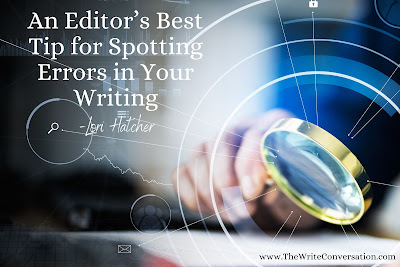
by Lori Hatcher
As a freelance editor for a major publishing house, I use about ten different layers of editing on every project I review. Would you like to know the most helpful one? The one that enables me to spot sneaky errors I’ve passed over multiple times?
Hearing the work read aloud.
But not reading it aloud myself.
Wait, what?
If you read your writing aloud, you’ll read what you meant to say, not necessarily what you wrote. Word Weavers International members (you are a member, aren’t you?) find it super helpful when another member reads our piece. We catch repetitions of sounds and words, awkward phrasing, and missing punctuation.
But critique groups don’t meet every day. In between gatherings, how can we hear our work read aloud?
Technology.
Microsoft Word Read Aloud Feature
Did you know Microsoft Word has a Read Aloud feature? Yep, there it is, right there under the Review tab. On my screen, the button sits in the Review tab ribbon on the far left, next to the Spelling and Grammar button.
Once you click this tab, a smaller box opens that lets you play, go back, or go forward. If you click the speaker/gear icon, you can even adjust the reading speed and choose from a variety of AI voices. Prefer to hear your word read in Grandma’s voice? There’s an option for that. Sandy is my favorite, because she sounds most realistic. Be warned, though. Ralph sounds like a scary Arnold Schwarzenegger. If you’re writing a thriller, this might work, but he makes my devotions sound really creepy.
Cell Phones
Most cell phones also have the option for text to speech.
Jane Freidman, in her blog post, “A Writer’s Secret Weapon: Add a Listening Pass to Your Editing Arsenal,” gives these instructions: “First, email yourself the document or text you’d like to have read aloud. Next, change the settings on your phone. If you have an iPhone, you’ll find the option under Settings > Accessibility > Spoken Content. Choose Speak Selection and Speak Screen. On this same screen, activate the Speech Controller (switch to ON).”
Then, open the document from your email and download it into your files. Activate the text-to-voice command and hear Siri read to you. This also works for ebooks.
With an Android phone, you’ll find the options in Settings > Accessibility and select the Text-to-Speech output.
Make Notes
Some like to sit in front of their computer with the document open as they listen, making changes as they go. Others prefer to listen while doing other things. I often review work while I walk. If you’re also a multi-tasker, be sure to have a way to make notes on what you want to change. I use the Notes app in my phone, but you can also scratch your thoughts on a piece of paper.
Two Listening Passes
I usually do a listening pass twice—once at the beginning of editing to listen for flow, content, and clarity; and at the very end of the editing process to listen for grammar, awkward phrasing, and repeated words or thoughts.
I’m always shocked at how many errors I find on that last pass. I suspect you will, too.
If you’re looking for a way to make your writing sharper, clearer, and more effective, consider listening to your work by using technology to help you edit.
Now it’s your turn. Do you use any Read Aloud tools to edit your work? Share your best tips in the comment section.
TWEETABLEAn Editor’s Best Tip for Spotting Errors in Your Writing from Lori Hatcher on @EdieMelson (Click to Tweet)
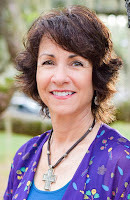 Lori Hatcher loves to inspire and equip others by sharing high-impact stories for spiritual transformation. A popular women’s ministry speaker and writing/speaking instructor, Lori is an Advanced Communicator Gold and Advanced Leader Bronze with Toastmasters International. She writes for Our Daily Bread, Guideposts, Revive Our Hearts, and Crosswalk.com. Check out her latest devotional, A WORD FOR YOUR DAY: 66 DEVOTIONS TO REFRESH YOUR MIND, from Our Daily Bread Publishing. Connect with her at LORIHATCHER.COM or on FACEBOOK.
Lori Hatcher loves to inspire and equip others by sharing high-impact stories for spiritual transformation. A popular women’s ministry speaker and writing/speaking instructor, Lori is an Advanced Communicator Gold and Advanced Leader Bronze with Toastmasters International. She writes for Our Daily Bread, Guideposts, Revive Our Hearts, and Crosswalk.com. Check out her latest devotional, A WORD FOR YOUR DAY: 66 DEVOTIONS TO REFRESH YOUR MIND, from Our Daily Bread Publishing. Connect with her at LORIHATCHER.COM or on FACEBOOK.
May 22, 2024
4 Best Things to Love About Being a Writer

by Henry McLaughlin @RiverBendSagas
When we consider our writing life, it’s easy to focus on the negative things, the hard things. As I reassessed my writing journey recently, I also thought of the good things about being a writer. Thus, the catchy title to this blog.
I identified what I consider four of the best things about being a writer. The best for me, anyway. I’m sure there are more.
Each of us has a unique writing journey. This is mine.
Creating Stories
Creating stories is why I write. I welcome the challenge of doing something I thoroughly enjoy and doing it in obedience to God.
A large part of my process is letting new ideas marinate in my brain. I’ve shared how most of my story ideas come from images that pop into my head. It’s usually the image of a person. Sometimes it’s a part of the story world, a part that grabs my interest.
My latest image is of a man standing in the doorway of an Old West saloon, drenched from the pouring rain. It’s late at night. He’s soaked, chilled, and hungry. His name is Joe Cooper. Why is he here the first question? And a story begins. I’ve written a couple of pages, but I’m waiting for Joe to tell me more.
Learning from the characters is part of this. About themselves. Their goals. Their values. How they see God. I enjoy watching them change and grow over the course of the story.
Building a story world is always fun for me. I enjoy the research that helps me make my stories unique and real to the reader.
Let’s not forget plotting. I’m a pantser, so the word plotting has a different meaning for me. For me, plotting is determining what my character wants and what is preventing him or her from getting it. What propels them into the story and what keeps them there?
The actual writing is a joyful release where all this pondering, marinating, brainstorming, and researching flows into reality on the screen before me.
Learning
Learning is one of the best aspects of writing. Learning about the craft and learning about people. There is a value in reading books and magazines and blogs, in following podcasts and webinars, in attending conferences and workshops. We can learn so much about tools and techniques to improve our writing.
Brick and mortar bookstores are also a valuable resource. It’s fun to wander a local bookstore or a Barnes and Noble. More fun than browsing Amazon. Something unusual will catch my eye, or I’ll talk with a sales associate who loves books as much as I do. Chatting with other customers in the same aisle I’m in.
In-person conferences are awesome and I’m grateful to God Covid didn’t kill them off. Being in that focused environment with teachers and other writers can set off the brain in exciting new directions and ideas for our writing. Friendships and encouragement flow like a mountain stream. At a recent conference, fellowshipping with other writers sparked an idea that led to rewriting the ending of my story.
Good critique groups are outstanding for sharing our work, learning about writing, and developing meaningful relationships.
Relationships
Relationships are important because even though writing is very much a solitary practice, we can’t do it in a vacuum. We need people. Over the course of my writing journey, I’ve had outstanding teachers and mentors who stick with me. Fellowshipping with other writers builds bonds that help us when we feel alone. Working with agents, publishers, editors, and other professionals strengthens and educates us in learning the craft and the business of writing. For many of us, writing is a calling. We need to remember it is also work and these relationships help us navigate the river of the journey.
Helping Other Writers
For me, helping other writers is right up there with creating stories as one of the very best things about being a writer. When God makes a way for me to help another writer, it’s a way for me to pay forward for all those who helped me on the journey. Being active in a critique group is part of this. And God has opened so many other doors for me in this area: I mentor, coach, edit, and teach. I enjoy seeing other writers grow in the craft as I help them learn about who they are as authors and as I help them fine tune their calling to be servants of God as writers.
How about you? What are some of the best things for you about being a writer?
TWEETABLE4 Best Things to Love About Being a Writer from author Henry McLaughlin (@RiverBendSagas) on @EdieMelson (Click to Tweet)
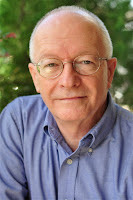 Henry’s debut novel, Journey to Riverbend, won the 2009 Operation First Novel contest.
Henry’s debut novel, Journey to Riverbend, won the 2009 Operation First Novel contest.Henry edits novels, leads critique groups, and teaches at conferences and workshops. He enjoys mentoring and coaching individual writers.
Connect with Henry on his BLOG, TWITTER and FACEBOOK.
May 21, 2024
Tips For Writing the Challenging Character
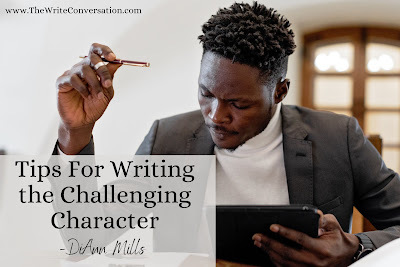
by DiAnn Mills @DiAnnMills
You’re an excellent writer. You’ve spent hours developing your character, but something’s missing. Frustration is eating a hole into your creativity because your character is too proud to admit he might not be perfect.
You have:
Researched your character’s personality.Interviewed him/her and asked tough questions.Developed a unique voice and dialogue.Established a setting that promises to spin the story into a whirlwind of action.
But the character is guarding his weaknesses and flaws. He won’t divulge one moment of backstory, and you’re helpless to discover his motivation for any behavior. It’s time to hit the psychology books. After all, this closed-mouth character may be the best one you’ve ever created.
Flaws and weaknesses in human nature stem back to creation. God created us with three needs: relationships, significance, and security. Those needs are supposed to be satisfied by Him. But Adam and Eve kicked off their own program of relying on God. The question is how does your character fulfill his basic needs that don’t factor God into the equation?
The following is a list of those weaknesses that your character may use to fill the empty spots in his life. Where does your character fit?MoneyPowerSexMaterial acquisitionWork, relationships, education, and aesthetic values
Your character uses his weaknesses to satisfy unmet needs. Characters have unmet needs that fall into these categories.Survival - the need to have continued existenceSecurity - the need for emotional and economic stabilitySex - the need for intimacySignificance - the need to amount to something and be worthwhileSelf-fulfillment - the need to achieve goalsSelfhood - the need for a sense of identity
Once the writer discovers weaknesses and unmet needs, then motivation slips into an issue of backstory. Human motives have been categorized into four areas, and these areas extend into each one. BiologicalSocialCognitiveSpiritual
So take a look at that stubborn character. What is his/her basic need? Is it relationships, significance, or security? Or a combination? What does he use as a Band-Aid to cover up what’s lacking in his life? What category does his unmet need slide into? Now what motivates your character into action?
TWEETABLETips for Writing the Challenging Character from @DiAnnMills on @EdieMelson (Click to Tweet)
 DiAnn Mills is a bestselling author who believes her readers should expect an adventure. She creates action-packed, suspense-filled novels to thrill readers. Her titles have appeared on the CBA and ECPA bestseller lists; won two Christy Awards; and been finalists for the RITA, Daphne Du Maurier, Inspirational Readers’ Choice, and Carol award contests.
DiAnn Mills is a bestselling author who believes her readers should expect an adventure. She creates action-packed, suspense-filled novels to thrill readers. Her titles have appeared on the CBA and ECPA bestseller lists; won two Christy Awards; and been finalists for the RITA, Daphne Du Maurier, Inspirational Readers’ Choice, and Carol award contests. She is the former director of the Blue Ridge Mountain Christian Writers Conference, Mountainside Marketing Retreat, and Mountainside Novelist Retreat with social media specialist Edie Melson. Connect here: DiAnnMills.com
May 20, 2024
How a Writer Looks at the Thriller Called Life
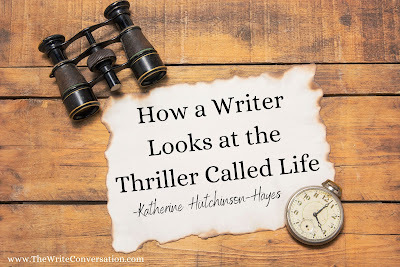
by Dr. Katherine Hutchinson-Hayes @KHutch0767
When authors pen thrillers, they must utilize three fundamental elements to help them craft, outline, and compose their book. These are known as the three Cs—the contract, the clock, and the crucible. The contract refers to the promise made to the reader that they will gain specific information by reading the book. The clock constantly pressures the protagonist to figure out their problem against a stringent timeline. The crucible is the pivotal part of the book when the antagonist and protagonist usually face off, and the protagonist is changed, arrives at a revelation, or solves a crucial problem.
As a thriller writer, I’ve seen parallels between the three Cs in this genre compared to our lives. For instance, when I worked on the draft of my debut novel, I committed to work on my book daily, even if it was a paragraph. At first, I worked through a third of the piece consistently. I had few setbacks until one Monday in November when my brother died suddenly. This changed everything. There was intense grief, funeral arrangements, and shock to combat. I pushed through and stayed up late, rose early, or did a combination of both to work on my novel. Enormous waves of guilt attacked me. How could you write a book when your sibling just died? What’s wrong with you?
Despite the onslaught of guilt and sorrow, I continued to write, knowing I’d promised myself and my mentor to finish my first draft within a specific timeframe. The sense that I was running out of time seemed to take precedence. Things worsened when my mother succumbed to COVID-19 eight weeks after my brother passed. I went into autopilot as I navigated the business of death and the deepest pain I’ve ever experienced, losing Mom—my best friend. Family conflicts arose. I had to terminate a dishonest attorney who’d been unethical in handling my mother’s will. Unable to sleep some nights, I stayed up and wrote. Sometimes, tears streamed down my face onto my keyboard, and I worried my computer would electrocute me. But I got through. Eventually, an honest lawyer closed the estate swiftly and ethically. We continue to work through family issues, but we’re better than we were. My book was published, and soon after, I completed the second thriller. I’m currently working on others.
Like my life, our lives read like multiple series of well-crafted thrillers, with twists and turns keeping us on the edge of our seats.
They involve the contract, the clock, and the crucible. The contract—is the agreement we make with God, ourselves, and society about what we want to achieve and how we will achieve it. We commit ourselves to a path that we hope will lead to success.The clock—represents the constant challenge we face to reach our goals, fix problems, and find our way despite constantly running out of time and dealing with obstacles. This ticking clock can be in our personal lives, such as health issues, emotional/relationship problems, or professional challenges, such as the death of a loved one, job loss, or a demanding boss. These obstacles can be frustrating and demotivating, but they also serve as opportunities for growth and development.The crucible—is a pinnacle in life, the point where everything comes together, and we face our ultimate challenges. This can be a crisis or a turning point leading to a new chapter in life. It’s also often a moment of truth, where we discover what we’re truly capable of, who’re our real friends, and who isn’t.
As authors, we may not all write thrillers, but we certainly live them. Our lifetimes are filled with pain, challenges, and obstacles. Yet, we also have joy, growth, and opportunities to develop in ways we may never have thought possible. Ultimately, we face moments of truth that define who we are, what we believe, and what we can achieve.
Embrace the journey and enjoy The Thriller Called Life.
TWEETABLEHow a Writer Looks at the Thriller Called Life from @KHutch0767 on @EdieMelson (Click to Tweet)
 Dr. Katherine Hutchinson-Hayes is a review board member and contributor to Inkspirations (an online magazine for Christian writers), and her writing has been published in Guideposts. Her work in art/writing is distinguished by awards, including the New York Mayor’s Contribution to the Arts, Outstanding Resident Artist of Arizona, and the Foundations Awards at the Blue Ridge Mountains Christian Writer’s Conference (2016, 2019, 2021). She is a member of Word Weavers International and serves as an online chapter president and mentor. She belongs to FWA (Florida Writers Association), ACFW (American Christian Fiction Writers), CWoC (Crime Writers of Color),
Dr. Katherine Hutchinson-Hayes is a review board member and contributor to Inkspirations (an online magazine for Christian writers), and her writing has been published in Guideposts. Her work in art/writing is distinguished by awards, including the New York Mayor’s Contribution to the Arts, Outstanding Resident Artist of Arizona, and the Foundations Awards at the Blue Ridge Mountains Christian Writer’s Conference (2016, 2019, 2021). She is a member of Word Weavers International and serves as an online chapter president and mentor. She belongs to FWA (Florida Writers Association), ACFW (American Christian Fiction Writers), CWoC (Crime Writers of Color),AWSA (Advanced Writers and Speakers Association), and AASA (American Association of School Administrators). She serves on the nonprofit organization Submersion 14 board and the 540 Writer’s Community board and is an art instructor for the nonprofit organization Light for the Future. Katherine hosts the podcast Murder, Mystery & Mayhem Laced with Morality. She has authored a Christian Bible study for women and is currently working on the sequel to her first general market thriller novel. Her thriller A Fifth of the Story will debut in February 2024 through Endgame Press.
Katherine flourishes in developmental editing and coaching writers. She has a twenty-year career in education, leadership, and journalism. Katherine freelances as an educational consultant for charter schools, home school programs, and churches. In this role, she has written and edited curriculum, led program development, and helped manage growth facilitating and public relations.
She also works as an editor and book coach through her consulting business. Katherine provides skill, accountability, and professionalism so clients can begin, develop, and finish their writing projects for publication.
May 19, 2024
Spiritual Loving Care for Your Writing Friends

by Karen Whiting @KarenHWhiting
Marketing and writing can discourage writers with rejection, low sales, poor platform, or getting stuck in the writing process. A friend recently thanked me for a little care package of silly items that she is opening up slowly to keep her going. It's not costly and filled with little dollar store and office items I had around the house, but matched with words and scriptures to lift her spirits.
If you have a friend who needs a lift, consider sending some spiritual loving care. Let some of it be silly to bring a laugh while adding a scripture or encouraging thought. Here are some fun items plus a few practical ones to help promote your friend's book. Some fit in a box and some are ones to share online. A suggested scripture is added to each idea.Pencil sharpener and question: Not happy with edits? Mention that sometimes our words need more refining, so be open to learning and rewriting, even if you have to keep sharpening your pencil and your mind [Hebrews 12:11].Create a few memes for your friend's book and email them with a note of encouragement [Jeremiah 29:11].Seashells with the question, 'Time for a change?' Seashells, beautiful as they are, remind us that God’s creatures know when to abandon something and move on to something new. Perhaps it is time to pray for direction and see if God has a new approach, or idea for a new proposal [Isaiah 42:9 KJV].Create a short video of you holding your friend's book and giving a testimony that you post and tag your friend with a note that God binds you together [Colossians 3:14].Small pompoms and a tag that you are his/her cheerleader. Note reasons you believe in your friend's writing [1 Thessalonians 5:11].Bouncy ball with a note that you pray they bounce back with joy no matter the mistake or the problem [Psalm 24:16].Post a review or send notes to friends or send a copy of the book to a friend who would enjoy it [Romans 12:10].Chenille stems (aka pipe cleaners) as a reminder to be flexible and change as the Holy Spirit nudges [Romans 12:2]Yo-yos and question, 'Feel like you are at the end of your rope?' Add a message to be thankful that holds the string. [Hebrews 2:4]Packet of salt and reminder that well-seasoned conversation helps, and you available to listen [Colossians 4:6].Recommend your friend to a media host as a guest [Proverbs 18:12].An eraser for a friend facing a bad review, hard critique, or other pain caused by a thoughtless remark or action. Let it be a reminder to forgive and ask for God's wisdom if change is needed [Colossians 3:13]Folder tabs and question, 'Feeling disorganized?' Suggest a few tools that might help [1 Corinthians 14:33].Writing can be lonely with no one in the home who gets it. Your care can make a difference!
TWEETABLESpiritual Loving Care for Your Writing Friends from @KarenHWhiting on @EdieMelson (Click to Tweet)
 Karen Whiting (WWW.KARENWHITING.COM) is an international speaker, former television host of Puppets on Parade, certified writing and marketing coach, and award-winning author of twenty-seven books for women, children, and families. Her newest book, The Gift of Bread: Recipes for the Heart and the Table reflects her passion for bread and growing up helping at her grandparent’s restaurant. Check out her newest book Growing a Mother’s Heart: Devotions of Faith, Hope, and Love from Mothers Past, Present, and Future. It's full of heartwarming and teary-eyed stories of moms.
Karen Whiting (WWW.KARENWHITING.COM) is an international speaker, former television host of Puppets on Parade, certified writing and marketing coach, and award-winning author of twenty-seven books for women, children, and families. Her newest book, The Gift of Bread: Recipes for the Heart and the Table reflects her passion for bread and growing up helping at her grandparent’s restaurant. Check out her newest book Growing a Mother’s Heart: Devotions of Faith, Hope, and Love from Mothers Past, Present, and Future. It's full of heartwarming and teary-eyed stories of moms.Karen has a heart to grow tomorrow’s wholesome families today. She has written more than eight hundred articles for more than sixty publications and loves to let creativity splash over the pages of what she writes. She writes for Crosswalk. Connect with Karen on Twitter @KarenHWhiting Pinterest KarenWhiting FB KarenHWhiting.
May 18, 2024
The Value of a Writer’s Notebook
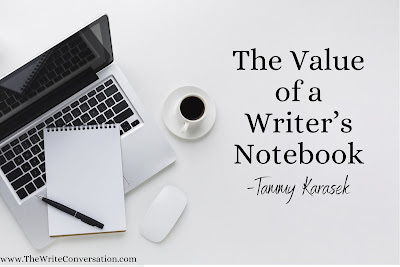
by Tammy Karasek @TickledPinkTam
For several years, I’ve read about using a Writer’s Notebook. Intrigued, I’d read all the ideas or suggestions for the use of such notebook I saw. While they all had something as different as the writer themselves, each of those notebooks had one thing in common—they worked for that particular writer in how they set up their own.
I’d see an idea I liked and would jot it on a sticky note. I accumulated these notes inside of a book I’d selected to use, in case I could be convinced it would, in fact, be a notebook I would want to use. I know I have far too many journals or notebooks I’ve started with a specific plan in mind only to find them sitting pretty on the shelf four months later without a new post during that time. This time, for this notebook, I was determined I wasn’t going to dive in and mess up another book with fifteen pages used. I would let the folks who used them prove to me their value.
First I’d like to offer you some suggestions I found in my searching over a year’s time of checking this possible writing organizational tool out.
Ideas for Your Writer's Notebook:Famous quotes about writingFavorite wordsOverused wordsArticle ideasBlog post ideasLists: books to read, websites to check, favorite writersDreamsGreat quotes caught while eavesdropping at the coffee shop—I mean researchQuirky things people do while people-watching—I mean research, againItems I’ve learned not to do in writing (no passive voice, adjectives-use wisely and sparingly, adverbs-use sparingly, no clichés, watch the slang)Book title ideasA list of those weasel words (likely, many, somehow, as much as … and more)A list of words you use way too many times in every chapter (I just happen to like to use the word just, I just can’t help myself.)Publishers to queryCool lines you think of that need to find a spot in your writing piece
While this is not all I found, it was enough to ignite my creativity to mold a writer’s notebook into something that would be of great help and value to me as I wrote.
I am an observer. I’ve been told I see things most people don’t see while they look straight into the same area. So, I watch. I listen. As I’ve gathered all of these ideas before pulling a blank book off of my shelf, I waited for the time that the items I should have in my own personal writer’s notebook became clear. Then I created my own personal writer’s notebook that works for me and how I think.
For each of the topics I’ve used, I do leave a page or two at the end of that particular section to add to the information I’ve already entered. In the Leuchtterm1917 lined notebook I use, my first two pages are for an index. This allows me to find the topic I need information from without flipping through the pages. When I add a new section at the end, I add another line in the index.
I’m still getting the hang of having this notebook but find I return to it more than I thought I would. A couple of the sections already look worn from my constant use of them, which shows me the value of this notebook and that it is set up how it will work for me and my writing.
What about you? Do you use a writer’s notebook? Do you have other topic ideas that have been useful for you in your writing? If you don’t use one, does the idea intrigue you even just a little?
TWEETABLEThe Value of a Writer's Notebook from author @TickledPinkTam on @EdieMelson (Click to Tweet)
 Tammy Karasek uses humor and wit to bring joy and hope to every aspect in life. Her past, filled with bullying and criticism from family, drives her passion to encourage and inspire others and give them The Reason to smile. She’s gone from down and defeated to living a “Tickled Pink” life as she believes there’s always a giggle wanting to come out! A writer of Romance—with a splash of sass. She’s also The Launch Team Geek helping authors launch their books and also a Virtual Assistant for several best-selling authors. Don't miss her recent book, LAUNCH THAT BOOK, just released in November.
Tammy Karasek uses humor and wit to bring joy and hope to every aspect in life. Her past, filled with bullying and criticism from family, drives her passion to encourage and inspire others and give them The Reason to smile. She’s gone from down and defeated to living a “Tickled Pink” life as she believes there’s always a giggle wanting to come out! A writer of Romance—with a splash of sass. She’s also The Launch Team Geek helping authors launch their books and also a Virtual Assistant for several best-selling authors. Don't miss her recent book, LAUNCH THAT BOOK, just released in November. Her work was also published in a Divine Moments Compilation Book—Cool-inary Moments. She’s also the Social Media Manager for the Blue Ridge Mountains Christian Writers Conference, Founding President and current Vice-President of ACFW Upstate SC, and Founding President of Word Weavers Upstate SC. She’s a writing team member for The Write Conversation Blog, Novel Academy, MBT Monday Devotions, The Write Editing and more. Connect with Tammy at HTTPS://WWW.TAMMYKARASEK.COM.
Improve Your Blogging Reach with These 14 Tips

by Edie Melson @EdieMelson
I love to blog, and I try to share my love of blogging when I teach at writing conferences.
I also know that many of you aren’t such fans. Many try to love blogging because it’s a good way to connect with readers and build an online presence. Others, don’t even try to love it, but do it out of necessity. The rest are like me, and enjoy the process as well as the connections it brings.
No matter where you are with blogging, it’s important to do it well. Whether you blog twice a month on a group blog, or daily on your own site, there are some essential dos and don’ts of blogging that I’d like to share today.
Blogging is a great way to build relationships with our audience.
But a lot of people forget that, just like building relationship in person, it’s never a good idea to talk so much that others don’t have a chance to share their thoughts.
I often visit blogs where I want to ask the blogger, “Are you blogging or lecturing?” There are things we can do to make sure our posts encourage conversation. And there are things we can do that discourage interaction.
The Dos of BloggingEnd every blog post with an open-ended question or a call to action. It’s not enough to ask a question at the end of the post. We must make sure the answer to the question isn’t just yes or no.Make sure the question posed doesn’t have an assumed right or wrong answer. This will shut down conversation even faster than a yes or no question. If we ask a question that has a definite right or wrong answer, very few people will be willing to risk the wrong answer. And after several have answered the question correctly, we’ll find no one else is answering because they feel like everything that needs to be said has been said.Ask readers to share an experience that relates to the post. Sometimes a blog post won’t lend itself to a question. In those instances we can encourage our audience to share their experience.Ask readers to add to a list of suggestions or tips that have been shared. I do that a lot on here. (And I’ll do it at the end of this post.) Again, if a question isn’t appropriate or feel right, ask them to contribute to the topic already introduced.Avoid using the pronoun YOU whenever possible. This is especially true if the post is pointing out something negative. Using the word you carries a finger-pointing connotation that we want to avoid. For example, in the point above, I would never say, “you must make sure the answer to the question isn’t just yes or no.” Instead, I phrased it, “We must make sure the answer to the question isn’t just yes or no.”Share your own personal experience. If we’re asking someone else to share, we need to make sure our blogs are a safe place for that. Going first rarely feels safe. So I always try to make sure I share my own experience before asking my readers to share theirs.Always try to answer blog comments. This doesn’t mean every single comment has to be answered individually, although I do try to do that. It’s important that your readers don’t feel like they’re commenting to nobody.Do Keep a Schedule: I’ve said it before and I’ll continue to say it until the day I die. If we expect our readers to come back regularly, we must be dependable. How often would you visit a business if you never knew whether or not it would be open? If we don’t have a new post up when we say we will, it’s like we’re not open for business.Do Include Social Media Links in Your Sidebar and on every page: Don’t miss out on valuable connections on other networks just because you’ve forgotten to add social media links to your blog.Do Use Proper Formatting & Images: This means utilize bold headings, bullet points, and images to illustrate your posts. Proper formatting will break up the text and make the blog easier to be read. Make your post scannable. This proves your post’s value and makes it more likely to be read.
The Don’ts of BloggingDon’t Make Your Post too Long: The ideal post length is between 700-900 words. Any longer and it’s much less likely to be read. Yes, there are exceptions. But those exceptions are just that, and many bloggers I talk to think they're the exception but they aren’t. It’s a hard truth, but shorter posts will up the engagement and readership of 98% of the blogs out there.Don’t Make Your Blog Hard to Read: Make sure the font used is a sans-serif font, like the one used here, which is VERDANA. As opposed to a serif font, like this one: Times New Roman. Also make sure your font is large enough to be easily read. Finally, be careful which colors you choose for your blog. Black on white is best, but at the minimum make sure there is a high contrast between background and text.Don’t Use Vague Titles for Blog Posts: Our audience will judge our posts on the expectations we set in the titles we choose. Also, social media is often a world without context. Use this question when choosing a title: If someone were to only read the title, would they know what the post was about? If the answer’s no, then choose another title.Don’t Clutter Your Blog’s Sidebar: The sidebar of our blogs should be organized in the order of importance. If the most important thing to you is having people sign up for updates for your blog, then email and RSS signups should be at the top of your sidebar. If it’s hard for people to find your sign up or your social media links, you’re missing out on building your online audience.Remember the main purpose of blogging is building relationships.
To build those relationships, we have to be good hosts when it comes to our blogs and make our readers fee welcome. We have to make it a place where people want to visit and want join the conversation.
What makes you feel welcome when you visit a blog? What turns you off? Be sure to leave your thoughts in the comments section below.
Don't forget to join the conversation!Blessings,Edie
TWEETABLEImprove Your Blogging Reach with These 14 Tips from @EdieMelson (Click to Tweet)
 Melson is a woman of faith with ink-stained fingers observing life through the lens of her camera. No matter whether she’s talking to writers, entrepreneurs, or readers, her first advice is always “Find your voice, live your story.” As an author, blogger, and speaker she’s encouraged and challenged audiences across the country and around the world. Her numerous books reflect her passion to help others develop the strength of their God-given gifts and apply them to their lives. Connect with her on her website, through Facebook, Twitter and on Instagram.
Melson is a woman of faith with ink-stained fingers observing life through the lens of her camera. No matter whether she’s talking to writers, entrepreneurs, or readers, her first advice is always “Find your voice, live your story.” As an author, blogger, and speaker she’s encouraged and challenged audiences across the country and around the world. Her numerous books reflect her passion to help others develop the strength of their God-given gifts and apply them to their lives. Connect with her on her website, through Facebook, Twitter and on Instagram.
May 16, 2024
Why Writers Need to Keep an Open Mind
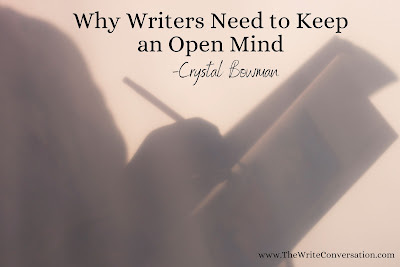
by Crystal Bowman
I have heard writers say, “I will only write something if it’s my idea.” Well, that’s fine if you plan on self-publishing. However, if you want to work with a publisher, either traditional or independent, a writer needs to be open to direction, critique, and even a different idea.
I self-published my first book which was my idea. Cracks in the Sidewalk was a collection of humor poems I wrote to supplement the poetry workshops I was doing in the local school. In a short time, I sold thousands of books and decided to pursue traditional publishing.
Since this was long before the Internet and websites, I called a local publishing house (Zondervan) and spoke with the children’s editor. He was impressed with my book sales as well as my experience in early childhood education and told me the kinds of book they were currently interested in acquiring. Three out of four ideas he shared were not my “thing.” But one of them was. When he said they were interested in launching a beginning reader series, my blonde brain started spinning. Five years later, I signed a contract for four beginning reader books, and another contract for four books soon followed.
Here's the thing:
Writing a beginning reader series was not my idea. But it was something I felt capable of doing, and it catapulted me into the world of publishing. Since then, I have written more than 100 books. Many of them were my ideas, some were ideas that publishers asked me to write—which I call, “assignment writing,” and others were a combination of both—meaning they were open to my ideas but wanted to see a different slant or direction.
Consider this:
When you hire a builder to build a house, you tell the builder what kind of house you want, including the size and style. If the builder said, “I only build houses that are my idea,” you would not hire that builder. You hire a builder because he has the experience to build a quality house for you, but you get to decide what type of house you want. He may offer suggestions based on his expertise, but the final decision is yours.
Publishers hire writers who have experience, but they may offer suggestions based on their own knowledge and experience as well. When they solicit a writer for a specific assignment, they choose a writer whom they feel is the best fit for the project.
Don’t be afraid to stretch yourself:
I was asked to submit a proposal for the comic page in a popular kids’ Christian magazine. Though this wasn’t in my “wheelhouse,” I thought it wouldn’t hurt to try. With some input from my brilliant and creative daughter, I created some fun animal characters, wrote a comic, and submitted a proposal. To my surprise, the editor offered me a contract but requested a slight tweak which I was happy to make. That was more than 10 years ago. I am still writing the comic page for that magazine and had no idea how much I would love writing it!
Bottom line:
Write what you want to write and publish it however you can. But keep an open mind and be willing to write other material because you are a writer, and someone trusts you to write something they want to see in print. Explore all the writing opportunities that come your way. It’s okay to say no if you feel it’s outside of your ability (I could never write a novel!) but say yes when you can and don’t be afraid to stretch yourself. You just might end up doing something you didn’t know you would love!
TWEETABLEWhy Writers Need to Keep an Open Mind from author Crystal Bowman on @EdieMelson (Click to Tweet)
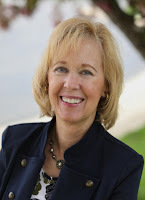 Crystal Bowman is an award-winning, bestselling author of more than 100 books for children and families. She also writes lyrics for children’s piano music and is a monthly contributor to Clubhouse Jr. Magazine, Arise Daily, and Christian Children's Authors. She enjoys coaching children's writers as well as teaching at writers conferences. When she is not writing or speaking, she likes going for walks and spending time with her huggable grandkids. She and her husband live in Michigan and Florida and try to avoid snowstorms.
Crystal Bowman is an award-winning, bestselling author of more than 100 books for children and families. She also writes lyrics for children’s piano music and is a monthly contributor to Clubhouse Jr. Magazine, Arise Daily, and Christian Children's Authors. She enjoys coaching children's writers as well as teaching at writers conferences. When she is not writing or speaking, she likes going for walks and spending time with her huggable grandkids. She and her husband live in Michigan and Florida and try to avoid snowstorms.WWW.CRYSTALBOWMAN.COMWWW.FACEBOOK.COM/CRYSTAL.BOWMANWWW.FACEBOOK.COM/CRYSTALJBOWMANWWW.INSTAGRAM.COM/CRYSTALBOWMANAUTHOR
May 15, 2024
Congratulations to the Winners of the 2024 Christian Indie Awards!
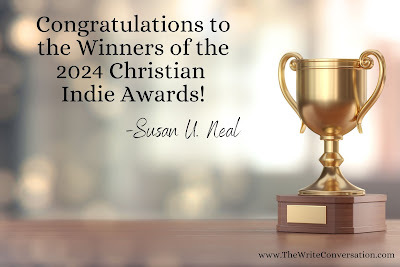
by Susan U. Neal RN, MBA, MHS @SusanNealYoga
The results are in for the 2024 Christian Indie Awards, and we're thrilled to announce this year's winners across 21 book categories celebrating outstanding works in Christian publishing.
The awards ceremony took place on April 27th at The Well Conference in Hudsonville, Michigan, in conjunction with the CAN Marketing Awards. Categories with tied winners included Christian Living and Mystery/Suspense.
"The Christian Indie Awards shine a spotlight on the best inspirational books from independent authors and small publishers," said Susan Neal, director of the awards program. "We're honored to recognize these talented writers."
Since 2008, the Christian Indie Awards have highlighted the vital contributions independent Christian voices make to enrich readers' lives. Winning authors receive a trophy, certificate, and extensive media coverage through 400 Christian outlets, and potential retailer promotion at the Christian Product Expo.
Winners can display the respected award emblem on their book covers, enhancing visibility and credibility. The 2025 Christian Indie Awards are now open for entries of books published between 2022-2024 at ChristianAward.com.
The Christian Indie Publishing Association (CIPA), sponsor of these awards continues its mission to support and promote the independent Christian publishing community.
Join us in congratulating this year's exemplary Christian Indie Award winners!
2024 Christian Indie Award Winners ChristianAward.com
Category
Place
Title
Author/Publisher
Anthology
1st
The Night Cometh: 20 Fantastical Short Stories
Lorilyn Roberts / Rear Guard Publishing, Inc.
Bible Study
1st
Nobody Sees This Creation: The Origin of the Devil and His Replacements
Paul Renfroe / Paradigm Lighthouse
Bible Study
2nd
Surrender the Joy Stealers: Rediscover the Jesus Joy in You
Doris Swift / Elk Lake Publishing
Bible Study
3rd
Dear Food, I Love You. I Hate You. Don’t Leave Me! A Bible Study Designed to Help you Shatter Food Strongholds for Lasting Health and Joy
Julia Fikse / One Step to Wellness
Business Finance
1st
Resolve: A Personal Finance Planning Book for Twentysomethings Getting Serious About Stewardship
Will Ertel / Oikonomia Books
Children’s Picture Books
1st
Psalms in Rhyme for Little Hearts
Donna Wyland / Elk Lake Publishing
Children’s Picture Books
2nd
Be Still: A Mother’s Lullaby
Karla Bauer
Children’s Picture Books
3rd
Love Connects Us All
Michelle Medlock Adams / Wren & Bear Books
Children’s 8-12
1st
Noise in the Night
Katrina Hoover Lee
Children’s 8-12
2nd
Ella Helps a Friend
JoAnne Check
Children’s 8-12
3rd
How to Kill a Giant
Carol Schlorff / Elk Lake Publishing
Christian Education
1st
Rooted in the King’s Garden
Deborah Hall Subetto / Encourage Publishing
Christian Education
2nd
America in the Balance
Rick Scarborough and Steve Feazel / 21st Century Press
Christian Education
3rd
How to Be a Worship Songwriter
Stephen Robert Cass / Songs4God Media
Christian Living
Tied for 1st
Art for the Soul: Growing Your Faith Through Creativity
Kelly Brinkmann / Kelly Brinkmann Enterprises
Christian Living
Tied for 1st
Captive Set Free: How to Find Freedom Through Forgiving
Valerie Limmer / Green Sap Publications
Christian Living
2nd
Mom, You’re Amazing! And Other Things I Want to Tell You
Sandy Cooper
Christian Living
3rd
The Next Thing
Cecil Taylor / Inscript
Devotional
1st
The Christmas Devotional: Hope & Humor for the Holidays
Michelle Medlock Adams and Andy Clapp / End Game Press
Devotional
2nd
The Gift of Tears: A 10-Week Devotional Journey
Annette Ford / Westbow Press
General Fiction
1st
A Future and a Hope: Stories of Spiritual Healing After Abortion
Cynthia Jordan / Westwood Books
General Fiction
2nd
The Wise Man
Michele Chynoweth / Elk Lake Pubishing
General Fiction
3rd
Love on Life Support
Deb & Bruce Potts / Elk Lake Publishing
Gift
1st
Tea Attitudes: A Blend of Tea, Life & Faith
Pamela G. Kennedy
Historical Fiction
1st
All Battles End at Sunset
Jared Acuna / Hilt and Arrow
Historical Fiction
2nd
Redemption’s Promise
Sandi Rebert / Dramatic Difference
Historical Fiction
3rd
The Pardon
Rodney Powell
Memoir / Biography
1st
King Solomon’s Empire: The Rise, Fall and Modern-Day Influence of an Iron-Age Ruler
Archie W. N. Roy PhD and Margaret P. Roy / Ambassador International
Memoir / Biography
2nd
Now I See: How God’s Amazing Grace Transforms the Deepest Pain to Shining Joy
Janet Perez Eckles
Memoir / Biography
3rd
Paws, Purpose and Possibilities: How therapy dogs and faith healed my heart
Gail Scoates
Mystery / Suspense
Tied for 1st
Uncommon Vengeance
Jennifer Haynie
Mystery / Suspense
Tied for 1st
The Chaos Spiral
Adam “Doc” Brackin / Wootton Major Publishing
Mystery / Suspense
2nd
Dead Air: A Waco Mystery
Mary L. Hamilton
Mystery / Suspense
3rd
East of Evil
Joni M. Fisher
Novella
1st
The Innocent for the Guilty
Sandi Rebert
Personal Growth
1st
Unstick Your Mind: Shift Your Mindset, Develop Grit & Break Barriers
Mimika Cooney
Personal Growth
2nd
Not Over Yet - a single mom’s guide to reclaiming hope
Stephanie Bartelt / Not Over Yet Book
Personal Growth
3rd
Grace Maps: Our Journey Guided by God’s Grace
Carmen Horne / Cotton Port Publishing, LLC
Poetry
1st
Saint Express: That Weird Christian Kid
ChuChu Ukpabi / Faith Train
Relationships / Family
1st
Mom, You’re Amazing! And Other Things I Want to Tell You
Sandy Cooper
Relationships / Family
2nd
Savage Marriage Study Guide: Overcome Your Past. Fight for Your Future.
Phil and Priscilla Fretwell
Relationships / Family
3rd
God’s Grace and Grit: Surviving Your Fairytale
Carolyn Snelling and Tiarra Tompkins / Carpenter’s Son Publishing
Romance
1st
Hope is Built
Davalynn Spencer
Romance
2nd
This I Promise You
Mary A. Felkins / Gardenia Press
Speculative
1st
Safe Harbor
Kristen Terrette / Elk Lake Publishing
Speculative
2nd
The Genesis 6 Project
Michael Ferguson
Theology
1st
Dear Saints: Catechesis on Saints
Jacob Huether
Theology
2nd
One with God
Pierce Taylor Hibbs
Young Adult
1st
The Diary of Daniel Shepherd
Jerry Schultz
Young Adult
2nd
Recruit of Talionis
C.J. Milacci / Fayette Press
Young Adult
3rd
Forgiveness at Skeleton Cove
Laura L. Morgan
TWEETABLECongratulations to the Winners of the 2024 Christian Indie Awards! @SusanNealYoga on @EdieMelson (Click to Tweet)
 Susan U. Neal, RN, MBA, MHS: Susan’s mission is to improve the health of the body of Christ. She has her RN and MBA degrees, as well as a master’s in health science. She is a CERTIFIED HEALTH AND WELLNESS COACHwith the American Association of Christian Counselors. She published five books, the Selah award winner 7 STEPS TO GET OFF SUGAR AND CARBOHYDRATES, CHRISTIAN STUDY GUIDE FOR 7 STEPS TO GET OFF SUGAR AND CARBOHYDRATES, HEALTHY LIVING JOURNAL, SCRIPTURE YOGAa #1 Amazon best-selling yoga book, and YOGA FOR BEGINNERSwhich ranked #3. She published two sets of Christian Yoga Card Decks and two Christian Yoga DVDs that are available at CHRISTINAYOGA.COM. Her digital product HOW TO PREVENT, IMPROVE, AND REVERSE ALZHEIMER’S AND DEMENTIA is a great resource. To learn more about Susan visit her website SUSANUNEAL.COM You can also connect with Susan on FACEBOOK, TWITTER, and INSTAGRAM.
Susan U. Neal, RN, MBA, MHS: Susan’s mission is to improve the health of the body of Christ. She has her RN and MBA degrees, as well as a master’s in health science. She is a CERTIFIED HEALTH AND WELLNESS COACHwith the American Association of Christian Counselors. She published five books, the Selah award winner 7 STEPS TO GET OFF SUGAR AND CARBOHYDRATES, CHRISTIAN STUDY GUIDE FOR 7 STEPS TO GET OFF SUGAR AND CARBOHYDRATES, HEALTHY LIVING JOURNAL, SCRIPTURE YOGAa #1 Amazon best-selling yoga book, and YOGA FOR BEGINNERSwhich ranked #3. She published two sets of Christian Yoga Card Decks and two Christian Yoga DVDs that are available at CHRISTINAYOGA.COM. Her digital product HOW TO PREVENT, IMPROVE, AND REVERSE ALZHEIMER’S AND DEMENTIA is a great resource. To learn more about Susan visit her website SUSANUNEAL.COM You can also connect with Susan on FACEBOOK, TWITTER, and INSTAGRAM.
May 14, 2024
I'm praying for Your Writing Dream and Against Any Discouragement You May Feel
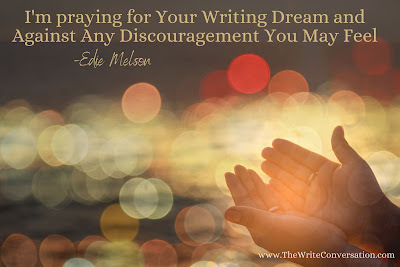
by Edie Melson @EdieMelson
For we are God’s handiwork, created in Christ Jesus to do good works, which God prepared in advance for us to do. (Ephesians 2:10 NIV)
Dear Lord, You have put a dream in the heart of every person reading this. This dream is such a fragile thing. But is it really? In truth, with its roots resting in You, it’s one of the strongest things we have. Lead us places to help this well-rooted dream grow. Keep us from yanking it out from the root when we are frustrated and don’t think things are moving the way they should or as quickly as they should.
Protect us and this seed dream from discouragement. When we feel overwhelmed with a loss of hope, turn us back to You. No matter where we are in this process, there is opportunity for discouragement to grow around these dreams like weeds keeping them from flourishing. Give us some weed-killing friends and encouragers. Don’t let things that happen or things that are said to choke our dreams to dust.
There have been opportunities for each of us to be singled out and encouraged. These can be uplifting to those receiving this recognition and discouraging for those who don’t receive the same acknowledgement. Each of these leaves us open to growth or bitterness. Help everyone to choose growth. Don’t allow these things to stop our progress. Instead use them in our lives to strengthen our resolve and make us strong and more able for Your service.
You have planted these dreams we carry with us. Remind us that we can trust You in the growth process and to provide the exact nourishment—at the exact right moment. Teach us to take the difficult things and use them to make us better.
Give us wisdom to see that an easy path is rarely the best path. Struggles make us stronger and more able to encourage others along the way. Give us the wisdom to see that You allow hard times for a purpose to bless. Instead of wallowing in the difficulty, remind us to search for and hold onto Your strength.
Give each of us encouragement along this journal. Guard the words spoken to each of us, those who speak them and the hearers. Let us all be fully and completely devoted to You and Your purpose.
TWEETABLEI'm praying for Your Writing Dream and Against Any Discouragement You May Feel, @EdieMelson (Click to Tweet)
 Melson is a woman of faith with ink-stained fingers observing life through the lens of her camera. No matter whether she’s talking to writers, entrepreneurs, or readers, her first advice is always “Find your voice, live your story.” As an author, blogger, and speaker she’s encouraged and challenged audiences across the country and around the world. Her numerous books reflect her passion to help others develop the strength of their God-given gifts and apply them to their lives. Connect with her on her website, through Facebook, Twitter and on Instagram.
Melson is a woman of faith with ink-stained fingers observing life through the lens of her camera. No matter whether she’s talking to writers, entrepreneurs, or readers, her first advice is always “Find your voice, live your story.” As an author, blogger, and speaker she’s encouraged and challenged audiences across the country and around the world. Her numerous books reflect her passion to help others develop the strength of their God-given gifts and apply them to their lives. Connect with her on her website, through Facebook, Twitter and on Instagram.



